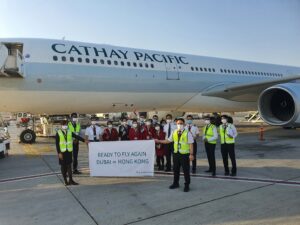
The Cathay Pacific Group recently released its 2020 Sustainable Development Report that highlights the initiatives brought about by the pandemic to lead the charge towards sustainable aviation and ensure future generations can experience the joy of travel.
The latest Cathay Pacific Sustainability Report has identified the progress made in reducing carbon footprint and measures taken to tackle operational sustainability matters. The airline announced its commitment to achieve net-zero carbon emissions by 2050.
To get the lowdown on how Cathay Pacific is engaged on ecology matters and a wide range of other subjects, Global Supply Chain interviewed Vishnu Rajenderan, Area Manager, Middle East. He spoke expansively about all things cargo, performance, expansion plans and the carrier’s spirited response to the pandemic challenges. 
Global Supply Chain (GSC): How significant is the cargo sector & cargo operations / component from a revenue standpoint for Cathay Pacific?
Vishnu Rajendran (VR): We have always had a strong foothold in both verticals of our business, passenger and cargo. However, given the current scenario that we are in, cargo has definitely emerged as the stronger sector between the two business units. While it has always been one of the fundamental drivers of our business, our reliance towards cargo has increased.
Our global cargo revenue in 2020 was HK$ 24,573mn (US$ 3.166bn), an increase of 16.2% compared to 2019 and we continue to see a firm demand for cargo going forward.
GSC: How significant is the UAE and the region for Cathay Pacific? How is demand holding up in the region? Do you operate freight only flights into the region?
VR: For over 40 years, Middle East as a region has always been of prime importance to Cathay Pacific especially from a cargo perspective. For the month of June, not only are we operating five freighters to Europe and one weekly freighter to Hong Kong, ex-Dubai, but have also deployed a weekly freighter into Riyadh, thereby expanding our footprint in the GCC region.
Precovid-19, we had a robust passenger schedule which was fourteen flights per week that supported our cargo services. However, after a temporary pause in our services due to the pandemic, we have resumed our passenger operation, albeit with a reduced schedule. 
Our resumption of passenger flights on 21 May, 2021 was positively received by both passengers and trade partners, particularly from the cargo side of the business. Owing to the demand for both passenger and cargo flights, we will be ramping up our frequency to two flights per week from July onwards.
We have always seen a mix of demand for various products, specifically for the renowned Expert LIFT product, wherein we tailor make solutions for customers to transport odd-size shipments on our freighters. Moreover, our partners prefer using the Expert LIFT solution since we pick up odd size shipments such as engines from the shippers warehouse and load them directly on to our flight.
Going forward we continue to see a similar demand for general cargo, secure cargo as well as courier shipments especially to 4th and 6th freedom.
GSC: How did Cathay Pacific (Cargo) perform in the UAE / Middle East region in 2020 and how does that compare with your 2019 performance?
VR: 2020 was indeed a challenging time for the aviation industry as a whole. However, our cargo operations proved to be a ray of hope across our global network, including the UAE. We operated a total of 143 freighters, 158 passenger flights and 24 cargo-only-passenger flights in 2020.
We saw strong demand for medical supplies over 6000kg of passive pharma shipments. In a world with new ways of working such as Work-From-Home and online schooling, we saw an increase in demand for electronics, specifically laptops being uplifted to USA, mainly Miami.
GSC: What is your outlook for 2021? What new products / initiatives (if any) do you plan to launch for CX this year?
VR: Cathay Pacific was one of the first few airlines to be hit by the pandemic and we have taken numerous measures to stabilise our business. Understanding the importance of servicing our customers and trade partners across our business verticals has been immensely important for us. Not only are we regularly reviewing the developing situation but are also communicating with our customers actively, helping us service them better.
Our focus has been on enhancing our expertise and being technologically progressive. We are in the process of fast-tracking our digitalisation projects such Blockchain management, taking the lead in IATA’s ONE Record initiative, adding the Envirotainer Releye RLP for carriage on our aircraft fleet–being the first Asian airline to do so, as well as adopting the CommonPass. We continue to take strong safety measures for our customers travelling with us as well as provide them with the flexibility they require.
We understand the impact that vaccination will have on global travel and have encouraged our teams to get vaccinated. We believe that increased vaccination will help in normalizing international travel globally.
Furthermore, we stand ready to support people from different countries and communities around the world. Through our efforts to bring Hong Kong residents home from the United Kingdom or supply essential medical aid to India, we will do whatever we can, whenever required.
GSC: How many destinations regionally and globally does CX cover? What are your top 3 destinations for out-bound cargo from UAE?
VR: Cathay Pacific has a robust network of over 200 destinations across the world. In addition to our hub, Hong Kong, Europe continues to be a key focus as we operate direct flights to Amsterdam, Frankfurt and Paris from Dubai. We also see strong demand to the South West Pacific.
GSC: Where does CX stand with regard to passenger flights out of your Hong Kong hub into the Middle East? When do you propose to resume flights into this region?
VR: Owing to the pandemic last year, we had temporarily suspended operations in 2020. However, we recently resumed weekly passenger operations on 21 May 2021 and have deployed the Airbus A330 on the Hong Kong–Dubai–Hong Kong route. We intend to increase this to two flights per week from July and continue to remain optimistic towards a further increase in frequency, in the near future.
GSC: Cathay Pacific recently published its 2020 Sustainability Report. How vital is Sustainability for the carrier and why?
VR: With the pandemic looming over us, we recognise the importance of a sustainable and safe future, more than ever. We believe the four aspects of sustainability, i.e. environment, social, economic and governance is of paramount significance to us. Through our sustainable development strategy policy we aim to go beyond the jurisdictions of not only doing business, but have an multi-layered impact as a humble employer, a value-adding community member, and a service provider that exceeds our customers’ expectations.
Over the years, including the time when during the pandemic our sustainability journey never stopped. We continue to focus on the key initiatives across our business, be it in on board by reducing paper, serving sustainably sourced food or even on-ground by reducing ground emissions from non-aircraft operations by investing in multiple methods including energy-saving measures such as low-impact lighting devices, chilled water system optimisation and ground fleet vehicle electrification.
We have also taken delivery of 10 new fuel-efficient aircrafts, reduced a significant amount of single-use plastic from our baseline, and introduced our ‘4R’ Single-use Plastic Strategy: Rethink, Reduce, Reuse, Recycle. Furthermore, we eliminated 43 million pieces of single-use plastic items from our annual usage baseline and have also committed to achieving net zero carbon emission by 2050.
GSC: What are the key takeaways and highlights from the report in relation to safety, biodiversity, food sustainability and climate?
VR: Safety: Safety has always been our number one priority. In the face of a global health threat, we are committed to safe travel more than ever. We launched Cathay Care, a new protocol that incorporates exceptional hygiene and disinfection practices at airports and onboard our aircraft to ensure the wellbeing of our customers and our people during their journeys. In 2020, we also introduced the new Port Restart Process to enable the safe return of passengers and employees to closed airports when conditions allow.
Biodiversity: We implement policies that protect against illegal animal trade, serve sustainable seafood on our flights and work with suppliers to promote practices to reduce their environmental impact. In 2020, we served over 58 tonnes of certified sustainable seafood and carried out 1,672 air cargo screenings on 151 freight forwarding agents in line with our Sustainable Development Cargo Carriage Policy. Our priority in 2021 is to continue working with civil society organisations to prevent illegal wildlife trades.
Food sustainability: We recognise the need to conserve certain species that are endangered due to the problem of overfishing, and have established our internal Sustainable Food Policy to provide guidance for our purchasing decisions. We consciously opt out of purchasing specific unsustainable food items. Additionally, as a step to provide customers with plant-based dishes and meat alternatives, we have been serving customers Beyond Meat.
Climate: The Cathay Pacific Group has committed to achieving net-zero carbon emissions by 2050. We recognise that our industry must decarbonise in order to mitigate the impact of climate change and as one of the leaders in the industry we aspire to be one of the chief contributors to the global efforts.
We have set up a dedicated cross-functional Climate Action Steering Group and have also developed an approach to tackle climate change. This approach extends from managing our own operations, to working with industry bodies and helping our customers to reduce their carbon footprint from flying.
We have further identified five core areas of our climate change strategy – Carbon Offsetting and Reduction, Scheme for International Aviation (CORSIA), Sustainable aviation fuel, Carbon offset programme, Aircraft emissions and Ground emissions, and have actively been understanding and enhancing our existing efforts in all these areas.
GSC: What is CX’s composition (kinds and range of products) for both inbound and outbound from the UAE?
VR: We see an array of different shipments across our operations from the UAE. One of the products that continues to have an increase in demand are odd-size shipments. Additionally, we also see a demand for shipments ranging from general cargo, dangerous goods and valuable goods. We also provide expertise loading through nose door operations where required.
As we continuously study the demand for different product segments from the Middle East, we believe that product innovation is key. We recently launched two additional products in the UAE and across the network–Vaccine Solution and Skid FCB, which is only seen in inbound shipments.
GSC: What are your short and long term expansion plans & vision for CX? Do you plan to open up new destinations in the region? Going forward, what opportunities and challenges do you foresee for CX in the UAE and the region?
VR: One of the major challenges we face is the ambiguity that lies ahead. However, the past year and a half has forced us to study different strategic approaches. Our focus going forward would be to carefully, yet effectively implement solutions that accommodate the market demand, utilise the current cargo capacity to the maximum as well as to provide innovative offerings through strategic partnerships. A key opportunity definitely lies in the transport of vaccines.
We have launched the Vaccine Solution which caters to the extreme temperature range required for vaccine transportation. Additionally, the delivery of our A350s as well as our technological expansion, will undoubtedly help us better serve our customers on both passenger and cargo fronts.
While we gradually resuming our flights to various destinations, we are positive that once border restrictions start easing, we will see an uptick in passenger demand and further increases in capacity.
We have been operating in the UAE for over 40 years. This continues to be a strategic and very important market for us. While the pandemic decimated passenger demand, we believe the future does hold many opportunities. One of which is being the ability to cater to pent up demand by connecting passengers safely, efficiently and comfortably to their preferred destinations.
On the cargo side, limited schedules across the network have undoubtedly had an impact on our cargo carrying capacity. In this regard, we continue to study the market and evaluate different opportunities. We are confident that we will overcome this challenge as travel restrictions ease.






